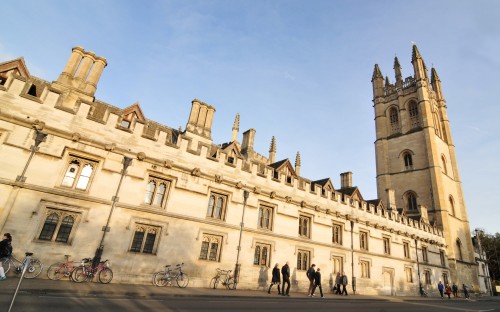And many still see annual lists of employment figures and MBA Rankings as crucial in deciding which school to attend.
So it might come as a surprise that commentators still lambast the b-school staple as no longer valuable to have, citing an increased amount of MBA graduates and rising competition in the MBA Jobs market.
The rising cost of MBAs, which at top b-schools can cost as much as $100,000 per year, is also a constant criticism. You may also have to quit your job or postpone it, taking one, or often two, years out of industry.
When Tony Beshara, president of Babich & Associates - a recruitment firm in the US - hinted that MBAs just aren't worth it anymore, he became the latest in a long line of critics of the MBA community: "It's a big myth. It doesn't make you a better professional. You're either good or you ain't," he was quoted as saying by Business Insider.
"I have never in 38 years had a company hire a candidate because or not because they had an MBA. And I would certainly never quit my job to go to business school so I can go out and get a better one."
Yet, many more recruiters have praised the hiring of MBAs, and many cite an increasing demand. Our Inside View section gives readers the low-down on how to break into some of the world's most popular firms.
Last month Erika Neumann, a recruiter from Schindler Group, told BusinessBecause that they actively seek MBAs and often hire from b-schools such as INSEAD, London Business School and St. Gallen: "Every year we recruit a number of MBAs for specific positions, help them identify their potential and develop the individuals to gain expertise in a field - or a leadership position.
"We have got a lot of challenging and rewarding jobs for MBA grads."
Chris Thomas, a recruiter at General Electric, regularly scours European b-schools in search of top MBA talent for the company's ECLP program. GE takes around 100 hopefuls onto the program - a huge chunk of which are MBAs.
"We've found that MBAs have the skill-sets to approach a wide array of projects from a multiple functional standpoint, as opposed to just being skewed to a finance or accounting specific approach," he told BusinessBecause.
"They tend to be better communicators; not only understanding or analyzing a problem and coming up with a solution, but being able to pitch it, sell it, and build interest. We've been partnered with INSEAD, LBS, IESE and HEC Paris for the last two years for our Europe hires."
But prospective students, too, worry about the costs and sacrifices they must make in order to get an MBA. Chris Gallagher is a prospective MBA applicant from London. He hopes to use b-school to move up the careers ladder in the not-so-distant future.
But what is his biggest concern? "Finance is always an issue isn't it? It's a big upfront cost, taking a year out of work," he says. "I'll take a loan, and use stocks and shares as a buffer."
He says that to reach the top of the food chain, an MBA will be "essential": "My next few promotions do not require an MBA. However, it is a good statement of intent and by the time I will be looking to go into management, an MBA will be a significant advantage."
No one wants to use their life-savings to attend b-school, although there are many MBA Scholarships available to help shoulder the burden. While it is true that MBAs are expensive (you'll have to make up your own mind whether the cost is "worth it"), the salary increases are more quantifiable.
A recent GMAC survey revealed that 42 per cent of recruiters surveyed would keep MBA salaries at just the same level in 2014. However, the same study showed that the majority of employers planned to increase base salaries for MBAs in-line with inflation. Just 2 per cent planned to decrease salary offers for MBAs.
London Business School, a top MBA ranking university, reported last month that 96 per cent of 2013 MBAs were offered employment within three months of graduation. LBS also says that their MBAs receive around a 134 per cent salary increase post-business school.
Other top MBA programs claim similar success: CEIBS in China report a 157 cent per cent salary increase for MBAs after three years of graduating, and The Fuqua School of Business in the US reports a 108 per cent increase.
There are clearly benefits to studying at top b-schools, although rankings don't necessarily translate into job success.
In the US, Emory University's Goizueta School of Business, regarded second to b-schools like Harvard, had the best MBA placement record of any top-30 US university, with 98.1% of the Class of 2013 reporting job offers within three months of graduation.
The fears of an "MBA bubble" may be quite unfounded. Michigan State University reported last month that MBA jobs market in the States would decline by 25 per cent.
But GMAC predicted a much brighter outlook for MBAs in 2014 - the latest employment figures show that salaries will remain roughly the same and the majority of employers they surveyed plan to maintain or increase MBA hires this year.
So who is right? Is there a tangible increase in MBA hiring? Are salaries set to drop or fall? Is an MBA still worth it?
Figures often reveal or hide the truth. And there is clearly evidence to suggest that many MBA programs will give you a considerable career boost - although applicants remain cautious about the costs.
But what is certain is that b-schools remain a safe bet on you landing a job after graduation - and more often than not, see an increase in your base salary.
To find out more about MBA programs and compare rankings, employment figures and GMAT requirements, visit our schools' pages here.
RECAPTHA :
9c
9f
c5
7e








